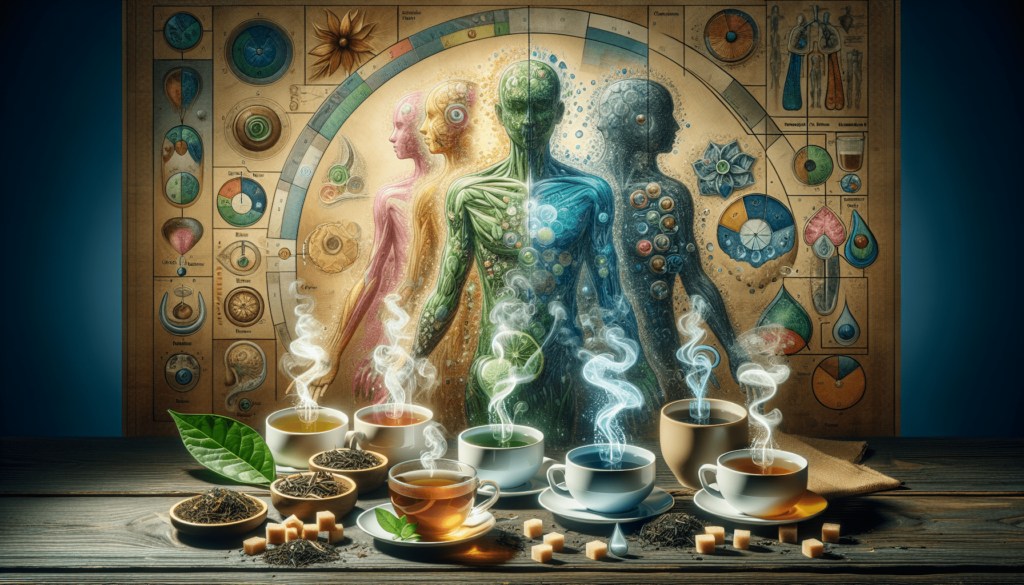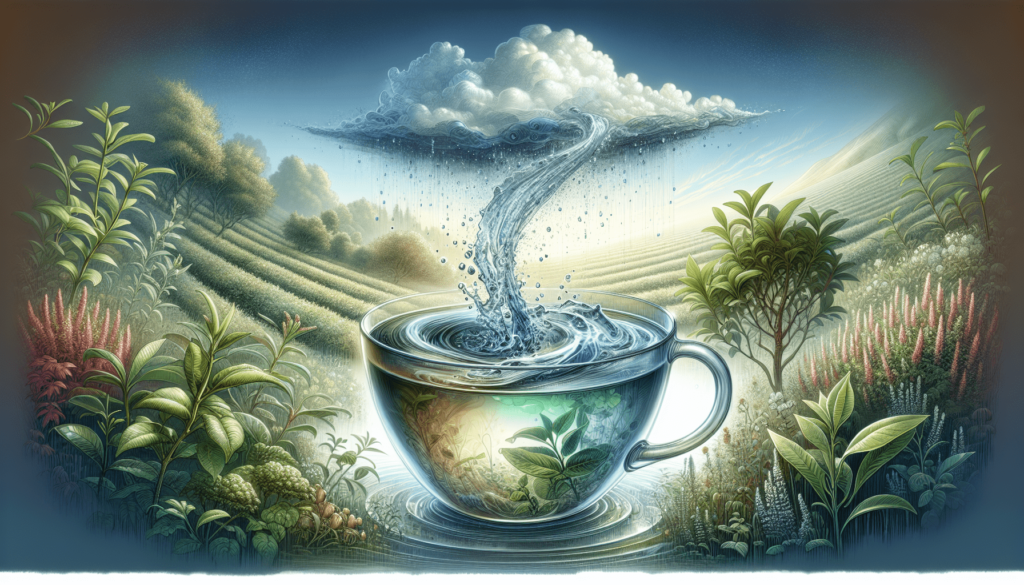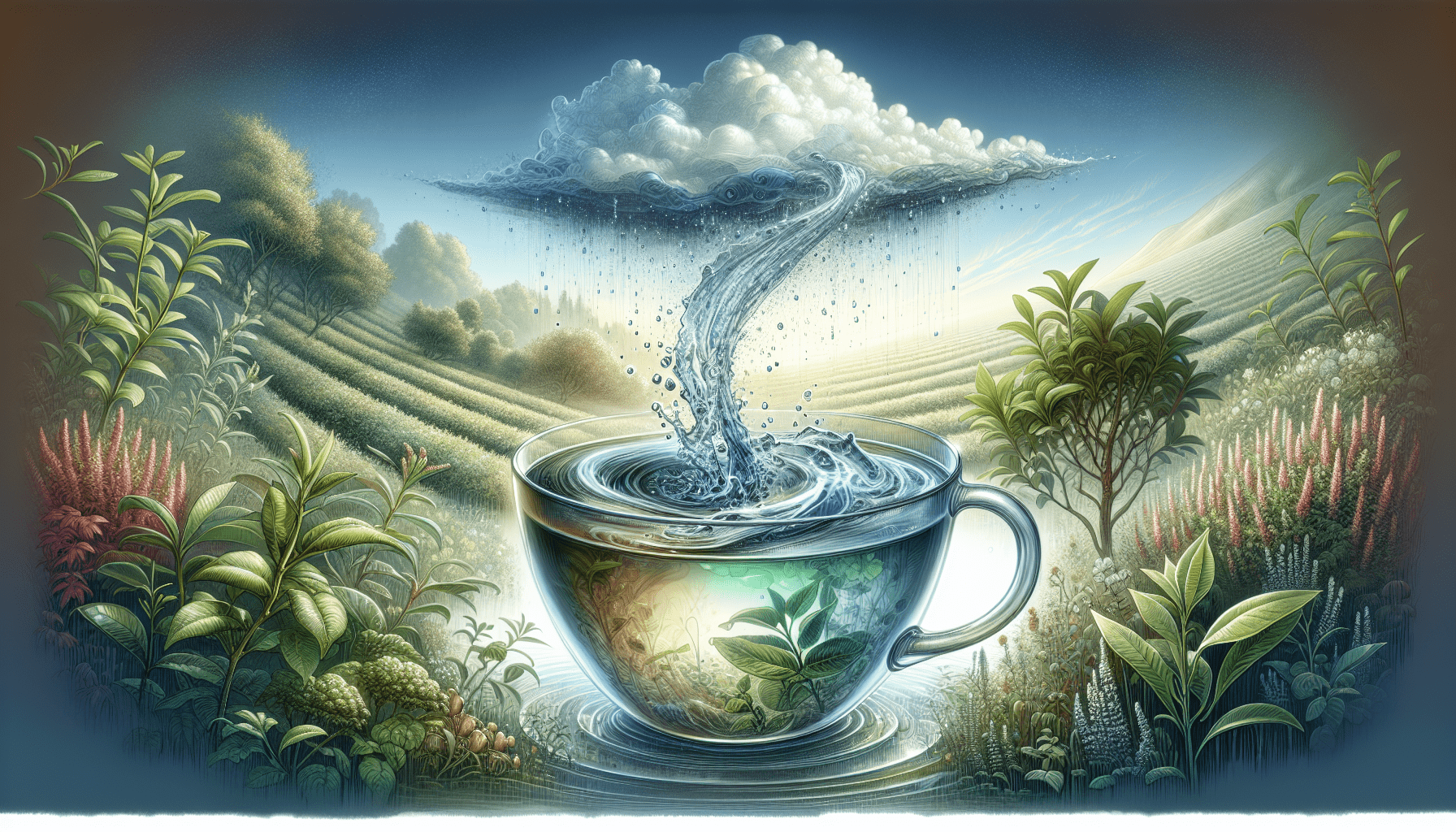Whether you start your morning with a steaming cup of black tea or unwind in the evening with a soothing herbal blend, there’s no denying the comforting effect of a good cup of tea. But did you know that tea does more than just warm your soul? In fact, it also contributes to your hydration and overall fluid intake. In this article, we’ll explore the various ways in which tea can quench your thirst and keep you hydrated throughout the day. So grab your favorite mug and join us on this journey to unravel the secrets behind the hydrating powers of tea.

The Role of Hydration
Importance of hydration for the body
Hydration plays a vital role in maintaining overall health and well-being. Your body relies on water to carry out essential functions such as regulating body temperature, aiding digestion, lubricating joints, and flushing out toxins. When you’re properly hydrated, you feel more energized, focused, and alert. Dehydration, on the other hand, can lead to fatigue, headaches, dizziness, and decreased cognitive function. It’s crucial to prioritize hydration to keep your body functioning optimally.
Benefits of staying hydrated
Staying hydrated offers a plethora of benefits for your body and overall well-being. Besides regulating body temperature and supporting digestion, adequate hydration helps to ensure the proper functioning of your organs, promotes healthy skin, and aids in weight management. When your body is hydrated, your muscles and joints are also better supported, leading to improved athletic performance and reduced risk of injuries. Additionally, being properly hydrated contributes to mental clarity, mood stability, and optimal cognitive function. By prioritizing hydration, you can enhance your overall health and quality of life.
Understanding Fluid Intake
Recommended daily fluid intake
The recommended daily fluid intake varies depending on factors like age, sex, activity level, and overall health. However, a general guideline is to consume approximately 8 cups (64 ounces) of fluids per day. This includes both water and other beverages. It’s important to note that this recommendation can increase in certain circumstances, such as during periods of intense exercise, hot weather, or illness. Consulting with a healthcare professional can provide personalized guidance on the appropriate fluid intake for your specific needs.
Different sources of fluid intake
While water is the primary source of hydration, there are various other sources of fluids that contribute to your overall intake. Apart from plain water, beverages like tea, coffee, milk, fruit juices, and herbal infusions also provide hydration to the body. However, it’s important to be mindful of the additional ingredients in some beverages, such as added sugars or artificial sweeteners, which may not offer the same benefits as pure water. Incorporating a variety of fluids can help you meet your daily fluid intake goals, while still enjoying a range of flavors and hydration options.
Hydration Levels in Tea
Water content in tea
Tea is predominantly composed of water, making it a significant contributor to your daily fluid intake. The water content in brewed tea varies depending on the type and brewing method, but generally ranges from 95% to 99%. This means that a cup of tea can effectively hydrate your body, providing refreshing relief and replenishing fluids. It’s important to note that the water content may decrease slightly if you add milk or other mix-ins to your tea.
Effects of caffeine on hydration
One concern often raised about tea is its caffeine content and its potential to cause dehydration. While caffeine is a mild diuretic, studies show that the amount of fluid provided by tea more than offsets any diuretic effect. In other words, the water content in tea counteracts the potential increase in urine production caused by caffeine. This means that drinking tea can still contribute to your overall hydration, even though it contains caffeine. However, it’s worth noting that if you consume excessive amounts of highly caffeinated teas, it may be beneficial to balance your fluid intake with additional water.

Hydration Potential of Herbal Teas
Hydrating properties of herbal teas
Herbal teas, also known as tisanes, offer a wide array of flavors and boast excellent hydration potential. Unlike traditional tea, which is derived from the Camellia sinensis plant, herbal teas are made from a blend of herbs, fruits, flowers, and other botanicals. Many herbal teas are naturally caffeine-free, making them a perfect choice for those who want to avoid caffeine-induced jitters. Some herbal teas, such as chamomile, mint, and hibiscus, have been found to have hydrating properties, further adding to their appeal as a refreshing and nourishing beverage.
Examples of hydrating herbal teas
Numerous herbal teas can provide hydration and a delightful sensory experience. Chamomile tea, derived from the daisy-like chamomile plant, offers a mild and soothing flavor, making it a popular choice for relaxation and hydration. Peppermint tea, known for its cooling and refreshing properties, not only helps to quench your thirst but also aids in digestion. Hibiscus tea, made from the vibrant hibiscus flower, is rich in antioxidants and has a fruity and tangy flavor. These are just a few examples of the wide variety of herbal teas available, each offering its own unique taste and hydration benefits.
Tea as a Source of Antioxidants
The presence of antioxidants in tea
Tea, especially green and black tea, is renowned for its high antioxidant content. Antioxidants are compounds that help protect our cells from damage caused by harmful free radicals. The catechins found in green tea, such as epigallocatechin gallate (EGCG), are particularly potent antioxidants. Black tea, which undergoes a more extensive oxidation process, contains a different class of antioxidants called theaflavins. These antioxidants have been linked to numerous health benefits, including reduced risk of chronic diseases and improved cardiovascular health.
Benefits of antioxidants for overall health
Consuming foods and beverages rich in antioxidants is essential for maintaining optimal health. Antioxidants help combat oxidative stress, which is linked to chronic inflammation, accelerated aging, and various diseases. By neutralizing free radicals, antioxidants contribute to overall cell health, strengthen the immune system, and support vital body functions. Regularly incorporating tea into your hydration routine can provide a significant source of antioxidants, boosting your overall health and well-being.
Different Types of Tea and Their Hydration Benefits
Green tea and its impact on hydration
Green tea, renowned for its numerous health benefits, is an excellent choice for hydration. Its hydrating properties, coupled with its high antioxidant content, make it a popular beverage among health-conscious individuals. Green tea contains relatively low levels of caffeine compared to black tea and coffee, making it a suitable choice for those seeking a milder stimulant effect. When brewed, green tea has a delicate, grassy flavor that can be enjoyed both hot and cold. By incorporating green tea into your hydration routine, you can reap the benefits of hydration and antioxidants simultaneously.
Black tea and its hydration potential
While black tea contains higher caffeine levels than green tea, it is still hydrating due to its high water content. The robust and full-bodied flavor of black tea makes it a quintessential choice for tea lovers worldwide. Whether enjoyed plain or with milk and sugar, black tea can provide both hydration and a rich taste experience. It’s worth noting that the diuretic effect of caffeine is relatively mild, and the overall water content in black tea efficiently compensates for any slight increase in urine production. Therefore, sipping on a cup of black tea can contribute to your daily fluid intake without causing significant dehydration.
Factors Affecting Hydration from Tea
Brewing time and water temperature
The brewing time and water temperature play a crucial role in determining the hydration potential of tea. Steeping tea for the appropriate duration allows for maximum extraction of flavors and nutrients. Overbrewing tea, especially green and black tea, can result in a bitter taste and diminish the overall enjoyment. Similarly, water temperature affects the extraction of flavors and compounds from tea leaves. Optimal brewing temperatures for different types of tea may vary, and following the recommended guidelines can help ensure a satisfying and hydrating tea experience.
Quality of tea leaves and their impact on hydration
The quality of the tea leaves used can significantly impact the hydration benefits provided by tea. Higher-quality tea leaves generally contain more essential oils, flavors, and antioxidants, enhancing the overall tea-drinking experience. Investing in premium teas sourced from reputable suppliers can not only elevate the taste but also provide you with a tea that offers optimal hydration potential. Opting for loose leaf teas instead of tea bags can also enhance the quality and freshness of the tea, allowing you to enjoy the full benefits of hydration and flavor.
Hydrating Tea Recipes
Refreshing iced tea recipes
Iced tea is a popular choice, especially during hot summer months, when you crave a refreshing and hydrating beverage. With countless flavor combinations and variations, iced tea offers endless possibilities to tantalize your taste buds while meeting your hydration needs. Classic iced tea, infused with lemon or mint, is a delightful and simple option. For a fruity twist, try brewing herbal teas like berry or tropical fruit blends and pouring them over ice. You can also experiment with adding slices of fresh fruit or herbs to your iced tea for an extra burst of flavor. The options for hydrating and tantalizing iced tea recipes are limited only by your imagination.
Herbal tea blends for hydration
Creating your own herbal tea blends is a delightful way to personalize your hydration routine. By combining different herbs, fruits, and botanicals, you can create unique flavors that contribute to your daily fluid intake. A hydrating herbal tea blend may include ingredients like chamomile, lemongrass, ginger, and hibiscus, which not only offer hydration but also provide additional health benefits. You can experiment with different combinations and ratios until you find your perfect blend that satisfies your taste buds and keeps you hydrated throughout the day.
Hydration vs. Diuretic Effects
Understanding the diuretic properties of tea
The diuretic properties of tea, mainly attributed to its caffeine content, have been a subject of debate. While caffeine is known to increase urine production, studies suggest that the water content in tea counteracts the potential dehydration caused by caffeine. Moderate consumption of tea is unlikely to cause significant diuretic effects or lead to dehydration. However, it’s essential to be mindful of consuming excessive amounts of highly caffeinated teas, as this can impact your hydration levels. Balancing your tea consumption with adequate water intake and being attuned to your body’s needs can help maintain proper hydration levels.
Balancing hydration with tea consumption
The key to striking a balance between hydration and tea consumption lies in listening to your body’s cues. Paying attention to your thirst levels and ensuring you consume enough fluids, including water and tea, is crucial. Tea can be a wonderful addition to your hydration routine, providing a refreshing and flavorful alternative to plain water. By being mindful of your tea consumption and adjusting as needed, you can enjoy the hydration benefits of tea without compromising your body’s fluid balance.
Incorporating Tea into a Hydration Routine
Practical tips for increasing tea consumption for hydration
If you’re looking to incorporate more tea into your hydration routine, consider implementing the following practical tips:
-
Keep a variety of teas on hand: Stock up on different types of tea, such as green, black, herbal, and fruit infusions, to suit your mood and preferences.
-
Set reminders: Make it a habit to drink a cup of tea at specific times throughout the day. Set reminders on your phone or incorporate tea breaks into your daily routine.
-
Try different brewing methods: Experiment with brewing methods like loose leaf, tea bags, or even using tea infusers. Find the method that works best for you and enhances your tea-drinking experience.
-
Make it a social activity: Invite friends or family over for a tea party or organize virtual tea sessions to enjoy the hydrating benefits of tea together.
-
Explore new flavors: Step out of your comfort zone and try new tea flavors and blends. This can keep your tea-drinking experience exciting and encourage you to consume more tea for hydration.
Tea as a refreshing alternative to plain water
While water should always be the primary source of hydration, incorporating tea into your routine can offer a refreshing alternative. The variety of flavors and potential health benefits found in tea make it an excellent choice for those who want to enhance their hydration experience. Whether you enjoy a hot cup of green tea in the morning or a chilled herbal infusion in the afternoon, tea can provide hydration while simultaneously stimulating your senses. By incorporating tea into your daily routine, you can elevate the act of hydration into a delightful and nourishing ritual.
In conclusion, hydration is paramount for optimal health, and tea can be a valuable ally in maintaining proper fluid balance. The water content of tea, coupled with its potential for hydrating and flavorful herbal infusions, make it a versatile and enjoyable beverage choice. By understanding the factors affecting hydration from tea and being mindful of your tea consumption, you can harness the benefits of tea for hydration while savoring its unique flavors and promoting overall well-being. So grab your favorite tea cup, fill it with a steaming brew, and prioritize your hydration journey with the comforting and refreshing embrace of tea. Cheers to a hydrated and vibrant you!

